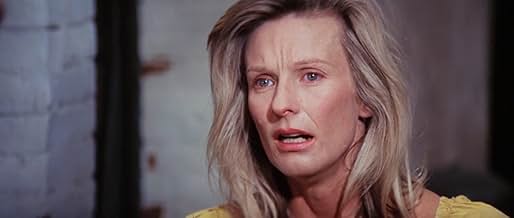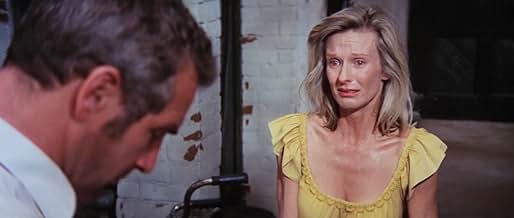PUNTUACIÓN EN IMDb
5,5/10
1,5 mil
TU PUNTUACIÓN
Añade un argumento en tu idiomaA radio station in the Deep South becomes the focal point of a right-wing conspiracy.A radio station in the Deep South becomes the focal point of a right-wing conspiracy.A radio station in the Deep South becomes the focal point of a right-wing conspiracy.
- Dirección
- Guión
- Reparto principal
- Premios
- 2 nominaciones en total
Reseñas destacadas
It is easy to go to 1970's and recapture the era. So many movies wanted to deal with the politics of the time. Parallax View with Warren Beatty, Twilight's Last Gleaming with Burt Lancaster, This movie was part of that attempt. However, unlike the excellent political movies of the 1960's, this movie lacked the quality of writing a Rod Serling and his peers brought to the table. So to truly enjoy this movie,overlook the heavy handed dialogue. Ignore the 1970's film making style and enjoy the excellent cast of actors. For its time it was an excellent movie. Looking at it today I still see the excellence but it has an eerie familiarity to today. Replace WUSA and there staring back at you is Murdoch and his Fox team. That sends a shiver up my spine.
As a relatively recent resident of the US, I continue to be astonished at how quickly American audiences forget their own history. I saw WUSA many years ago when I still lived in my native Italy (the Italian version was titled "Un Uomo Oggi" = "A Man Today"!). Two snippets of the film have been with me for all these years. The first is the radio host that invites all to drop what they are doing, go to the window, open it, and start screaming something like "I am fed up and I will no longer put up with this!" The second snippet is the last line delivered in the movie by the character interpreted by Paul Newman -- and I will not say what it says to avoid spoiling it. The themes are big and understandably audiences nowadays are impatient of 'dialog that sounds like speeches' (to quote an unfair reviewer on this site). The south, the issues of bigotry, racism, the Seventies, civic disobedience. At least the dialog has something to say, unlike so many films of the past 30 years. There is so much recent American history in this movie that it should be a mandatory assignment for college-age kids. Most people happily ignore its existence. Is there a way to convince anyone to make this piece available in DVD? It is too important to be neglected. No matter what Roger Greenspun says in his review appeared in the New York Times of November 2, 1970. In those days the Vietnam War coverage in the media made every single political reference seem like another opportunity for constipated American audiences to launch into yet one more conspiracy theory. And the Grenspun review blames WUSA for being 'ponderously allusive'. Maybe, with the hiatus of the past thirty-something years, the allusiveness will seem by now much less allusive and, who knows, we might enjoy this beautiful rendition of Robert Stone's novel. Besides the big issues, however, the movie is quite enjoyable. My vote of 8 only evaluates the viewing pleasure as entertainment.
A lot of what was predicted in the film Network about the media was also put forth in this film about radio WUSA. Sad to say it was laid on a bit too thick by its players and director.
Paul Newman who had a lot of faith in this project plays an itinerant disc jockey who both gets a job at this New Orleans based radio station WUSA and takes up with hooker Joanne Woodward, a girl whose heart really isn't in her work anyway.
As station owner Pat Hingle says, "this is a station with a point of view" and Hingle expects that point to be emphasized at all times. At that time the Richard Nixon White House was big on telling us that they were looking toward the great 'silent majority' of Americans who took the 'my country right or wrong' dictum to the exponential height. That's WUSA's point of view.
Newman is not a terribly sympathetic figure here which is one of the reasons the film flattens out. He sees what's wrong, but just goes with the flow. A whole lot like the characters with one exception in that other Louisiana based political drama, All The King's Men.
One who doesn't is Anthony Perkins who plays this rather pitiable 'survey taker' whose job is really to foster racial discontent by getting minorities thrown off welfare. I imagine there were many a Perkins out there, but this one doesn't like being taken for a fool and he reacts most violently. Perkins is probably the character you most remember from WUSA.
WUSA correctly predicted the advent of right wing talk radio about fifteen years before it became a fact. Rush Limbaugh would have been right at home on Pat Hingle's station. They've even got a right wing political preacher played by Laurence Harvey as part of their family. Harvey's another interesting character, but he's also laid on a bit thick for my taste. He should have adapted a more subtle approach to the part.
I wish I could rate such a prescient film as WUSA a bit higher, but the heavy handed approach just gets in the way.
Paul Newman who had a lot of faith in this project plays an itinerant disc jockey who both gets a job at this New Orleans based radio station WUSA and takes up with hooker Joanne Woodward, a girl whose heart really isn't in her work anyway.
As station owner Pat Hingle says, "this is a station with a point of view" and Hingle expects that point to be emphasized at all times. At that time the Richard Nixon White House was big on telling us that they were looking toward the great 'silent majority' of Americans who took the 'my country right or wrong' dictum to the exponential height. That's WUSA's point of view.
Newman is not a terribly sympathetic figure here which is one of the reasons the film flattens out. He sees what's wrong, but just goes with the flow. A whole lot like the characters with one exception in that other Louisiana based political drama, All The King's Men.
One who doesn't is Anthony Perkins who plays this rather pitiable 'survey taker' whose job is really to foster racial discontent by getting minorities thrown off welfare. I imagine there were many a Perkins out there, but this one doesn't like being taken for a fool and he reacts most violently. Perkins is probably the character you most remember from WUSA.
WUSA correctly predicted the advent of right wing talk radio about fifteen years before it became a fact. Rush Limbaugh would have been right at home on Pat Hingle's station. They've even got a right wing political preacher played by Laurence Harvey as part of their family. Harvey's another interesting character, but he's also laid on a bit thick for my taste. He should have adapted a more subtle approach to the part.
I wish I could rate such a prescient film as WUSA a bit higher, but the heavy handed approach just gets in the way.
I know this film bombed and has some platitudes that are unbelievable script-wise, but I can't believe the ratings people give this. I've been searching for this film for years (having seen in 1970) and it's haunted me. Newman, Woodward, and T. Perkins are awesome with an interesting character by Cloris Leachman. I love the script that has some holes, but 1970 was the perfect year for this type of story.
No matter what your political stance is OR was, this has something for everyone. Throw in Pat Hingle and Laurence Harvey as a preacher, it's Americana at it's most corrupt in a turbulent time (that I almost miss). If you can find this somewhere, give it a shot. An 8 out of 10. Best performance = Anthony Perkins.
No matter what your political stance is OR was, this has something for everyone. Throw in Pat Hingle and Laurence Harvey as a preacher, it's Americana at it's most corrupt in a turbulent time (that I almost miss). If you can find this somewhere, give it a shot. An 8 out of 10. Best performance = Anthony Perkins.
I have to agree with those who praise this film and realize that its not everyone's cup of tea. Although I appreciate the criticisms that some reviewers have leveled, it is wise to keep in mind that it is unfair to criticize a film 30+ years after its release through a contemporary lens. The sense of humor that some have found "lacking" is something that develops with the objectivity of lapsed time. During the late 1960's, many of us found little humor in the assassinations and general insanity that seemed to fill the political landscape. Like the previous reviewer, I, too, have been looking for this film for years and hope to see it on DVD one day soon. I found it to be a powerful piece.
¿Sabías que...?
- CuriosidadesPaul Newman researched the role by spending time at radio station KMPC in Los Angeles. The teen intern assigned to show him the operation was Ken Levine, who became a disc jockey before going on to be a writer on M*A*S*H (1972), Cheers (1982) and Frasier (1993), and a producer and director of other TV shows.
- Citas
Rheinhardt: I'm a survivor. Ain't that great?
- Versiones alternativasThe preview version ran 3hrs and 10 minutes according to cast member Robert Quarry. Much of his character and several other characters' motivation and dramatic development scenes were cut out before release.
- ConexionesReferenced in The Zodiac Killer (1971)
- Banda sonoraGlory Road
Composed and Performed by Neil Diamond
Selecciones populares
Inicia sesión para calificar y añadir a tu lista para recibir recomendaciones personalizadas
- How long is WUSA?Con tecnología de Alexa
Detalles
Taquilla
- Presupuesto
- 4.800.000 US$ (estimación)
Contribuir a esta página
Sugerir un cambio o añadir el contenido que falta

Principal laguna de datos
By what name was Un hombre de hoy (1970) officially released in India in English?
Responde




































